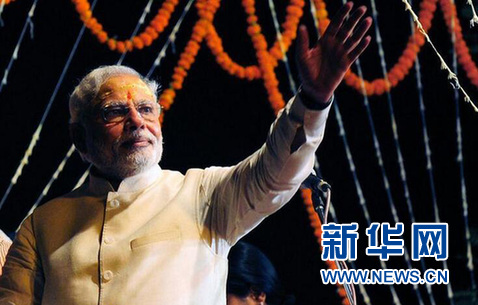Is India on course-correction bid to improve ties with Nepal?
- By Ritu Raj Subedi
 0 Comment(s)
0 Comment(s) Print
Print E-mail China.org.cn, February 8, 2018
E-mail China.org.cn, February 8, 2018

Indian Prime Minister Narendra Modi [Photo/Xinhua]
With the thumping victory of the Left Alliance in the three-tier elections in Nepal, India has woken up to the utter failure of its Nepal policy.
India's containment policy has led to a blowback, and India now appears to be pursuing an engagement policy aimed at coaxing the victorious Left Alliance in order to check "growing Chinese influence in its own backyard."
Indian Prime Minister Narendra Modi has made two telephone calls to CPN-UML chair KP Sharma Oli after his party swept the elections held in November and December of last year. In his conversation, Modi expressed his desire to work with Oli's government for the benefit of both countries.
In his response, Oli, who is the most likely candidate to be the next PM in a few weeks, said he was also eager to work with India in the interests of the stability and prosperity of Nepal as well as the betterment of Nepal-India relations under a different context.
Chairman Oli then asked Modi to send his emissary to Nepal for both sides to discuss bilateral matters at length. Accordingly, the Indian Minister for External Affairs Sushma Swaraj came to Nepal on Feb.1.
During her two-day stay, Swaraj held talks with the major leaders of the country, including Oli, CPN-Maoist Centre chair Pushpa Kamal Dahal Prachanda, Prime Minister Sher Bahadur Deuba and President Bidya Bhandari.
The UML hosted a dinner in her honor where the two sides pledged to wipe the slate clean. It has been learnt that Oli asked her to forget the bitter past and seek to improve Nepal-India ties based on the new realities. Oli sought Indian cooperation in the field of poverty alleviation and economic development in Nepal.
Swaraj said, "Nepal has received a clear mandate which I believe will help ensure stability, peace and development."
Immediately after touching down in Kathmandu's airport, she told journalists that the relations between the two countries were of such nature that they did not need an excuse to visit each other.
However, her visit comes at a time when the Left Alliance, which comprises the UML and Maoist Centre, is braced to form a new government. There is no dearth of critics who call the trip ill-timed.
For India, the rise of the Left Alliance in Nepal has become an inconvenient truth.
India, which has been accused of trying to micro-manage Nepal, had favored the Nepali Congress and Madhes-based parties during the crucial elections.
Quite the contrary occurred and Nepal's communists roared to victory on the plank of nationalism, stability and prosperity. It reflects the failure of Modi's neighborhood-first policy which he tried to apply through muscular tactics. India's failure to treat Nepal as an independent and sovereign nation has been the root cause behind the frequent impasses in Nepal-India relations.
In 2015, India imposed an unofficial blockade on Nepal for defying its diktats against the promulgation of a new constitution. The embargo caused economic devastation and deep psychological trauma to Nepalis, who were struggling to come out of the April earthquake. Nepalis will hardly forget the brutal blockade that turned their socio-economic life upside down.
The people handed a thumping win to the UML for its leader Oli stood up to Indian hegemony and forged an historic transit treaty with China, which granted the land-locked Himalayan nation access to the sea via Chinese territory.
During the election, the Left Alliance promised that its government would bring Chinese railways and investment to usher the country into an era of peace and prosperity. It is the people's mandate that the new government should cash in on the increasing Chinese investment and cooperation under its landmark Belt and Road Initiative (BRI)
Even for the victorious Left Alliance, India is a reality, not a choice. Sandwiched between the two giant neighbors, Nepal can't afford to side with any power. The tight geopolitical situation forces Nepal to tread a fine line, thereby responding to the genuine security and development concerns of both neighbors.
It is positive that Modi himself took the initiative to improve relations with Nepal. There was a time when Nepali leaders made a beeline for ingratiating themselves with the Indian establishment.
The victory of the communists has revered the situation now. Indian leaders are themselves making Kathmandu their first port of call to mend fences. However, there is no reason for Nepal to be complacent and euphoric. It must see to it whether Modi matches his actions to his words.
Besides, Nepal should seize the opportunity to execute independent foreign policies and build an image of credible nation that its neighbors lean on. The new left government will have a chance to develop Nepal as a dynamic bridge between Nepal, India and China, and give momentum to the trilateral cooperation for the shared peace and prosperity in the region.
Ritu Raj Subedi is an associate editor of The Rising Nepal.
Opinion articles reflect the views of their authors, not necessarily those of China.org.cn.






Go to Forum >>0 Comment(s)